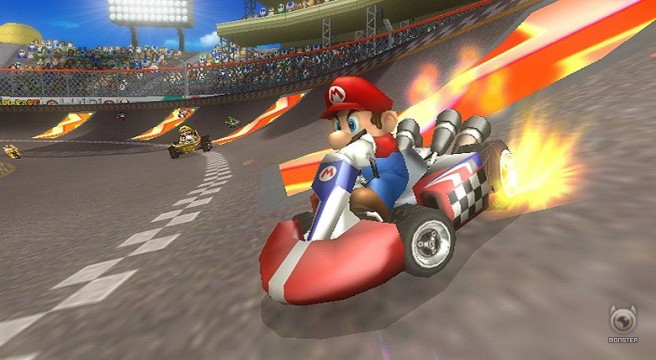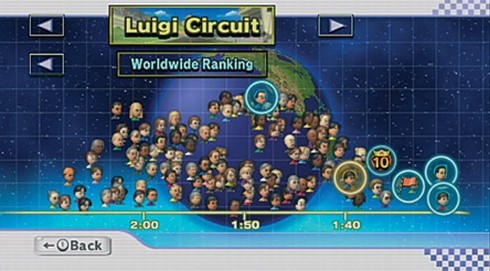
If I were to grab any old SNES game and boot it up, I would be able to experience it exactly as I did the day that I bought it. Sure, the visuals might not translate all that well to modern HD LCD and plasma displays, and maybe I would need to replace the battery in order to save, but in terms of content it would be unchanged. Of course, the same can also be said for all NES, N64, Game Boy, Virtual Boy, and most GameCube games, but this is no longer the case for DS and Wii libraries.
The impending shut-down of Nintendo Wi-Fi Connection is a tragic example of what I feel is an important issue facing the future of gaming. We have reached an age where games have a shelf life, a limited period of time in which they can be experienced as their designers intended before part of the game, or in some cases the entire game, disappears into a realm of complete inaccessibility. So long as part of a game requires a server to be experienced, its days are officially numbered because those servers cost money to operate and all companies need financially justifiable reasons to keep them active. Long time MMO fans are all too familiar with this problem as entire games can simply vanish once the player count dips too low. For PC gaming this isn’t as much of an issue, as the innate flexibility of the platform makes it much easier for fans to run their own servers, but the outlook for console games isn’t nearly as sunny.
This prospect, of course, presents a number of problems, the most apparent being its impact on the consumers. Hopping back in the time machine, who among us ever purchased a NES, SNES, or N64 game thinking that in there would be a time where I could pick up a game that would lose content over time? It is natural for us to expect the retail value of a game to decrease as it becomes old and less desirable, but it does seem somewhat odd that a game can lose major aspects of what made it fun and worth buying in the first place. In all fairness, plenty of companies do seem to make a concerted effort to keep support for many games running for quite a while, but the inevitable has a nasty way of catching up. Look back at the original iteration of Xbox Live, a service that effectively proved the potential of online gaming with consoles that ended with a slow death, as a handful of players slowly lost their connection to the last Halo 2 server ever to host a game. And when that game ended, each copy of Halo 2 became a little less enjoyable.

Content like this, along with many people’s bragging rights, will soon be gone.
Perhaps, then, this is another perk to Nintendo’s continued commitment to single player and local multiplayer.
While the value impact to consumers might be the biggest impact on the minds of most gamers, my focus is elsewhere. One very important aspect of any piece of art is how to best preserve it, and I am of the opinion that video games are most certainly an art form. While it most certainly hurts to lose a piece of a game you love, there is a much broader impact the loss of a mode or feature is having on the industry. Plenty of other art forms face the problem of degradation. Paintings might fade and buildings can crumble; for all valuable art there is a concerted art to preserve and restore it for the benefit of future generations. More consumable media, such as films and books, are much easier to handle; yes, paper will disintegrate and film doesn’t last forever, but the process of making and then copying a digital backup is simple and powerful. This can also be applied to older games and single player content, and one could argue the steps being taken on this front are becoming better with digital re-releases, such as Virtual Console, or more modern remakes and remasterings.
The academic side of video games is only going to continue to grow and there is great value in being able to see and experience classic games (past, present, and future) as they were designed. Now we can easily understand why students of game design would want to look back on The Legend of Zelda or Super Mario 64, but what about when looking back at Mario Kart Wii? Yes, they will be able to play the local modes, but all the online content will be lost. Furthermore, there are now console games entirely dependent on online connections and their numbers will grow– just think about Xbox One prior to Microsoft’s big 180 after E3 2013. Like it or not, this is the direction gaming is most likely to go in the not-too-distant future, so if anything the process of preserving these experiences is just going to get harder if there isn’t a drastic change to how the industry manages the aging of online games.
As the gaming industry grows as a technological and artistic medium, it is experiencing a slew of unique and interesting growing pains that we can only hope it will learn from. Developers race to embrace new technologies that will allow for better games, but in that hustle they can make the past less and less accessible for future gamers. Some might not care to miss out on the gameplay experiences that defined the youths of their elders, but I fear we are overlooking the value older games hold in sheer historical terms. Classic books and films remain bestsellers for a reason, and by no means is it an accident that millions of people travel from around the world every year to gaze upon the Mona Lisa– great art is timeless and can be appreciated for countless generations. Hopefully developers, gamers, and the industry at large can find a way to let everyone experience every facet of the great games of today and yet to come.




 ShareThis
ShareThis







The impermanence of older games is something I’ve been mulling over for a while now. The input jacks on TVs keep changing, making the playing of some old consoles increasingly difficult (you know at some point only HDMI ports will be back there). A lot of titles are landlocked to old systems. Finally, this, the issue of server reliance. A huge swath of gaming history will be lost if no one comes up with a viable solution